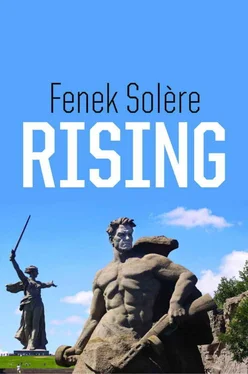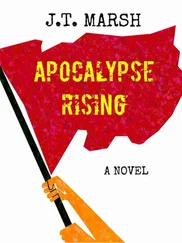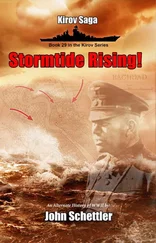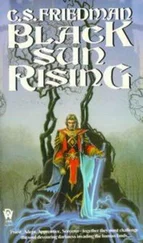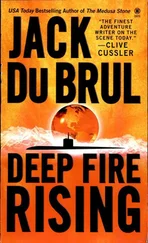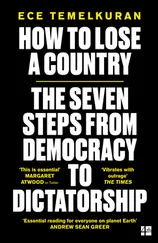A hotel car sat waiting, graphite and chrome in the pale wash of the foyer’s roof light. The barrel-chested driver made sure his passenger was safely belted before pulling out into traffic. They had not gone far before they stalled in a jam on the Pereulok Antonenko, just a little short of the Griboedova. A battered yellow street cab squeezed in alongside. The Mongol driver pressed hard on his horn. ‘Just like Milan’, Tom said under his breath. Vehicles edged forward, cutting each other up, trying to force their way into gaps before they closed.
Ten minutes later, the knot broke free. Cars were moving slowly past a broken-down Zhiguli 1500, bonnet lifted, its dead metal carcass lying flat like an old carthorse on the side of the road. A young family stood bereft, the blonde wife remonstrating with her husband, a crying infant in her arms.
‘Rubbish!’ his driver spat. Tom did not respond, unsure if he would be subjected to a tirade about how bad things were now, as opposed to the nouveau riche Russia of a decade earlier. The chauffeur had already shared his views on how normal Russians were hurrying to change their savings and pensions into furniture and jewellery. Tom was imagining scenes reminiscent of the bread queues of the early ‘90s as they listened to the car’s radio. An interview was being conducted by Benny Efrati for RIA Novosti with the new Governor of Russia’s Central Bank, indicating that the economic situation was reaching ‘super-critical’:
• The Russian Central Bank raises interest rates by 18 percent as a ‘shock and awe’ tactic to stem the tide, but fails to tame the market;
• George Soros re-emphasises his case, made a few years previously, that the West should see this return to Smutnoye Vremya , a time of troubles, as a precursor to open warfare;
• EU bankers escalate their economic leverage as a means to force Russia into accepting western Ukraine as a part of the NATO sphere of influence.
They pulled up in a narrow side-street near the water. Stragglers sauntered on both sides of the canal, heading back towards Nevsky after enjoying the Orthodox Choir at the Church of the Spilled Blood. Giant onion domes stood out against the stars, casting deep purple bruises over the stone embankment. He noticed a beautiful young couple standing hand-in hand-on a wrought-iron bridge. They embraced passionately. An old man cycled by, thin metal wheels rattling on chipped cobbles.
Tom stood at the driver’s window trying to negotiate the return trip. Getting nowhere, he twisted away, walking through the crowd, his body, along with many others, reflected in the burning translucence of a passing canal boat’s windows.
His initial impression was that the Sakura was anything but remarkable, a single neon sign hooked crookedly on a plain cement wall. He stepped down into the dimly-lit entrance and was quickly swallowed by the wide throat of a sunken stairwell. Pushing on the door, he entered, silver globes strobing the faces of guests as they swilled sake, rang forks on wine glasses, and called for birthday toasts.
He was name-checked by a demure kimono-clad waitress who took his coat, leading him through a tight tangle of drunken patrons. Credit cards were being swiped and handfuls of crumpled notes were clipped into a snapping cash register. Tom tripped along behind the diminutive Oriental through dense cigarette smoke to an alcove where Grigori was waiting with three other guests, two middle-aged men and a young woman.
‘ Privet, Professor Hunter’, he shouted excitedly, leaping up from behind a low table, hugging the new arrival in two bear-like arms. Tom identified the smell of pirated French cologne and imported cigars. ‘ Shto u vas jes t’vypit? ’ The Englishman looked bemused, but before he could excuse his poor Russian, Grigori corrected himself. ‘Sorry’, he laughed with his trademark belly bawl, ‘What would you like to drink?’
‘Beer?’ Grigori ordered a Heineken. ‘That is good beer’, he promised with a wicked wink. ‘It’s brewed locally!’ More laughter.
Turning his giant crocodile smile on the others, Grigori introduced Svetlana, a blonde, Germanic-looking girl with searching blue eyes and a voice like percolating coffee. She had been a research assistant to Alexander Dugin, former Head of the Sociology of International Relations Department at Moscow State University. It also transpired that she was a specialist in the political philosophy of Eurasianist thinkers like the linguist N S Trubetskoy, the geographer P N Savitsky, and G V Florovsky. Hunter took her hand respectfully. ‘And this is Dimitry, he is a freelance writer whose father was involved with Samizdat , Nash sovremennik , and Veche in the old days.’ Dimitry was an immaculately turned-out little man with a firm handshake and crisply lacquered white hair. ‘You may be familiar with his works on VSKHSON’s corporate state philosophy and the political doctrine of Danilevski, Struve, and Ilyin?’
‘I am delighted to meet you’, he said in broken English, ‘I am a great admirer of your work on Russian conservatism, and particularly your essay on Shafarevich’s Russophobia. ’
‘The pleasure is all mine’, Tom replied. ‘I read your excellent thesis on Solonevich.’ Then, collecting his beer from the waiter, he reached out to Grigori’s third guest, Alexander, a publisher of Pan-Slavic and occult journals.
‘I think we have a mutual hero?’ Alexander suggested. ‘I know you admire Michael Freeman, who translated The Book of Vles.’
‘Small world, I just read Chivilikhin’s Pamyat !’
‘The world is getting smaller all the time’, Grigori said conspiratorially as they settled down to eat from a melange of enamel bowls. ‘Knife and fork, or chopsticks?’
‘Sticks’, Tom confirmed. ‘After all, when in Rome.’ This made the Russians laugh.
‘We use fingers’, Alexander chortled.
‘I have never been to Rome’, Dimitry grinned, ‘but I think they like sushi there too, no?’
‘It’s a world-wide phenomenon’, the Englishman confirmed. ‘Indian and Chinese cuisine is even more popular than roast beef and boiled potatoes in my country.’
‘Surely not better than fish and chips’, boomed Grigori, bragging loudly to all in earshot. ‘When I was in London I ate fish and chips in Trafalgar Square, right under Nelson’s column. It tasted marvellous, even better with all the pigeon shit!’
• Prominent French politician Said Be Hassi travels to Moscow to chair a meeting between Orthodox and Muslim faith groups;
• Russian military forces become increasingly ineffective, working out of a dwindling number of bases across the Ob;
• The land west of the Taz and east of the Tobol rivers becomes known as Ma wara al-nahr, the new Trans-oxiana;
• Vladivostok’s Oriental Institute is renamed for the Islamic scientist, Abu Nasr al-Muhammad al-Farabi;
• A great revival in the philosophical works of Abu Ali Ibn Sina, known to the West as Avicenna, sees copies of his books roll off newly-established Islamic printing presses in Kostroma and Tula;
• ‘The Soviet kolkhoze-haust , sometimes spoken of kindly as collectivisations of a hundred years ago, led to the genocide of a third of our people. They closed mosques and arrested our ulema . But it was the Kazakhs who made up Panfilov’s men who stopped the Germans tanks outside Moscow! It was Sultan Baimagambetov who saved Leningrad! Ghani Safiullin who won Stalingrad! And it was Rakhimzan Koshkarbayev who raised the Red Flag over the Reichstag. And now it will be the Oralmen’s army that that seizes Orenburg and Omsk for the Nurli Zhol’, said Maxat Sarinzhipov, the new Kazakh President, speaking from the Temple of Peace, a sixty-two-metre-high pyramid in Astana;
Читать дальше
